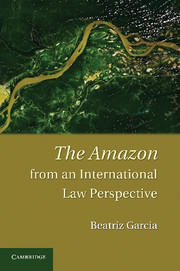Book contents
- Frontmatter
- Contents
- List of Maps and Figures
- List of Tables
- Preface
- Acknowledgments
- Abbreviations and Acronyms
- 1 Introduction
- 2 The Characteristics of the Amazon Region
- 3 The Origins of Regional Cooperation in the Amazon
- 4 The 1978 Amazon Cooperation Treaty
- 5 Regional and Subregional Organizations
- 6 Other Legal Instruments Adopted by the Amazon States Inter Se
- 7 Multilateral Treaties and Global Actors in the Amazon
- 8 Positive Incentives for Protecting the Amazon
- 9 The Legal Status of the Amazon
- 10 General Conclusions
- Bibliography
- Index
4 - The 1978 Amazon Cooperation Treaty
Published online by Cambridge University Press: 04 February 2011
- Frontmatter
- Contents
- List of Maps and Figures
- List of Tables
- Preface
- Acknowledgments
- Abbreviations and Acronyms
- 1 Introduction
- 2 The Characteristics of the Amazon Region
- 3 The Origins of Regional Cooperation in the Amazon
- 4 The 1978 Amazon Cooperation Treaty
- 5 Regional and Subregional Organizations
- 6 Other Legal Instruments Adopted by the Amazon States Inter Se
- 7 Multilateral Treaties and Global Actors in the Amazon
- 8 Positive Incentives for Protecting the Amazon
- 9 The Legal Status of the Amazon
- 10 General Conclusions
- Bibliography
- Index
Summary
The 1978 Amazon Cooperation Treaty (ACT) is an international agreement with regional application adopted by the eight Amazon countries (Bolivia, Brazil, Colombia, Guyana, Ecuador, Peru, Suriname, and Venezuela) with a view to promoting the harmonious development of their respective Amazonian territories in such a way as to “achieve also the preservation of the environment, and the conservation and rational utilization of the natural resources of those territories.” As a framework agreement, the ACT sets forth general guidelines for enhancing regional cooperation on a wide range of issues such as the utilization of natural resources, transport and communications, science and technology research, health, and tourism. The parties to this treaty intentionally devised a flexible and simple institutional framework, comprised of few organs and only temporary secretariats, in order to avoid excessive financial costs and burdensome bureaucratic procedures. However, they have soon realized the limitations of such a structure and as early as 1989 began to conceive ways of institutionally strengthening this treaty.
The normative and institutional evolution of the ACT is envisaged in Article 1, which requires the parties to undertake “operational agreements and understandings, as well as the pertinent legal instruments” in order to attain the treaty's objectives. Under this provision, ACT signatories are encouraged to negotiate more specific obligations to give effect to the treaty's general objectives. The question of whether the ACT's normative and institutional frameworks have indeed evolved to a more robust legal regime since the ACT's adoption in 1978 is the subject of the present chapter.
- Type
- Chapter
- Information
- The Amazon from an International Law Perspective , pp. 74 - 126Publisher: Cambridge University PressPrint publication year: 2011



